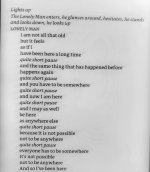Reflections on Jon Fosse, the last candidate I will write on. (You can check the other candidates in their respective threads.)
Fosse main interest isn't to look at social structures of society, but to look at, with musical flows and clear-sightnedness, the essence of reality and being: religion, freedom of will, time and immortality, and the purpose of art. Some of his characters escape society, seeks spiritual and artistic fulfilment, questions mortality, in dream-like, hazy prose. The questions of mortality raises his profile to the level of usual classics: Tolstoy, Dostoevesky and exploration of fragile consciousness calls to mind Beckett. His dramas, collected in six volumes and for which he first got international recognition, features generic characters: the Mother, Father, Child, and is characterized by the quality, musical flows that would be perfected in his prose masterpieces, and many of them involving themes of jealousy, which Fosse claims in interviews concerning his dramas "is the bases of most dramatic works." The constant thematic repetitiveness of his works, tend to echoes the reincarnations of individuals or oceanic tumbling waves.
In the first acclaimed novel Melancholia, published in two parts, we first see Fosse's stylistic spark finally reaching maturity. Based on Norweigan 19th century painter Lars Hertervig, Fosse describes Lars' fragile consciousness and repetitive ramblings. In the first, set in a single day in Dusserdolf and second section, set three years later on Christmas Eve in a mental institution. The final part, which takes place in the late 1980s, involves the character Vidme, who maybe a distant relative of the painter and who thinks of writing a novel based on Lars' paintings. This final part also involves the role of divine while Vidme's obsession, like Lars' obsession with masturabtion, obsessed with female breast, this time focusing on a female pastor whom he has conversations with about divine and religious faith.
Morning and Evening and Trilogy, his next two masterpieces, sustained the vision of Fosse's intense and rhythmic prose. The first novel looks at one day in the life of Johannes, the day of his birth on one hand, and the day of his death on the other. We see Johannes methodically moving from chore to chore, and Fosse bluring the line between reality and memory. And the focus of the novel, through the dazzling and thoughtful philosophical regulations of Johannes and Olav's as his wife his planning to give birth, is nature of God and existence. For Fosse, day appears to be attempt to answer both Olav and Johannes questions. The novel's mundane thought processes and dialogue, and the insight Fosse provides here is to explore what comes before and after and how man's time on earth comes to a close. For Fosse, everything's the same, yet totally different. The other masterpiece, Trilogy, which comprises of Olav's Dreams, Weariness and Wakefulness, traces marriage of Asle and Alide, the birth of their daughter, with the final volume Weariness focusing on events that happened before death of Ales. This novel possess biblical echoes, with good and evil, punishment and justice, love and sacrifice. The looping back in repetitiveness means all the essential points and occurrences are represented yet again with effectiveness and poetic prose and epic grandeur.
Fosse's greatness and acquisition of ticket into gallery of literary fame reached a new level with publication of seven volume-masterwork Septology. The oceanic tumbling waves, which had begun decades before in Melancholia, finally finds itself at everlasting quietude in this work of extraordinary first-rank, and which will soon be destined as one of the most enduring achievements of this century. Fosse's recursive reckoning with braided realities of religion, art, identity, family life and existence itself, reaches unparalleled heights with heightened interest in profound felt religious experience triggered by his own conversion to Catholicism. Fosse, in a single sentence throughout, charts the life of Asle, a painter living outsidee a Norweigan coastal village. Action transpires over course of few memory-- and prayer-filled-- days around Christmas while working on his irrevocable painting. Asle's struggle with Kant's metaphysical approach: freedom of will and immortality, and questioning the purpose of art from the view of his creator; like Plato with his cave, as something which can be close to it and not totally seen (reflections of darkness of art and life). This novel goes in accordance with Grahame Greene's vision of "spiritual dimension which gives the novel the needed human character, " is successfully adhered, with Asle's depiction drawing attention to Krapp and Reverend from Robinson's Gilead. Asle's reflections on painting remaining unfinished till an arrival of beam of light which suggest the illuminating theory of Carravaggio not only closes the novel, through Asle's prayers, but successfully guides the intellectual ship of Fosse, after the sea-waves, with musical flows and clear-sightendness illuminating essence of reality and being, safely into shores.

 www.theparisreview.org
www.theparisreview.org

 www.musicandliterature.org
www.musicandliterature.org


 www.theparisreview.org
www.theparisreview.org



